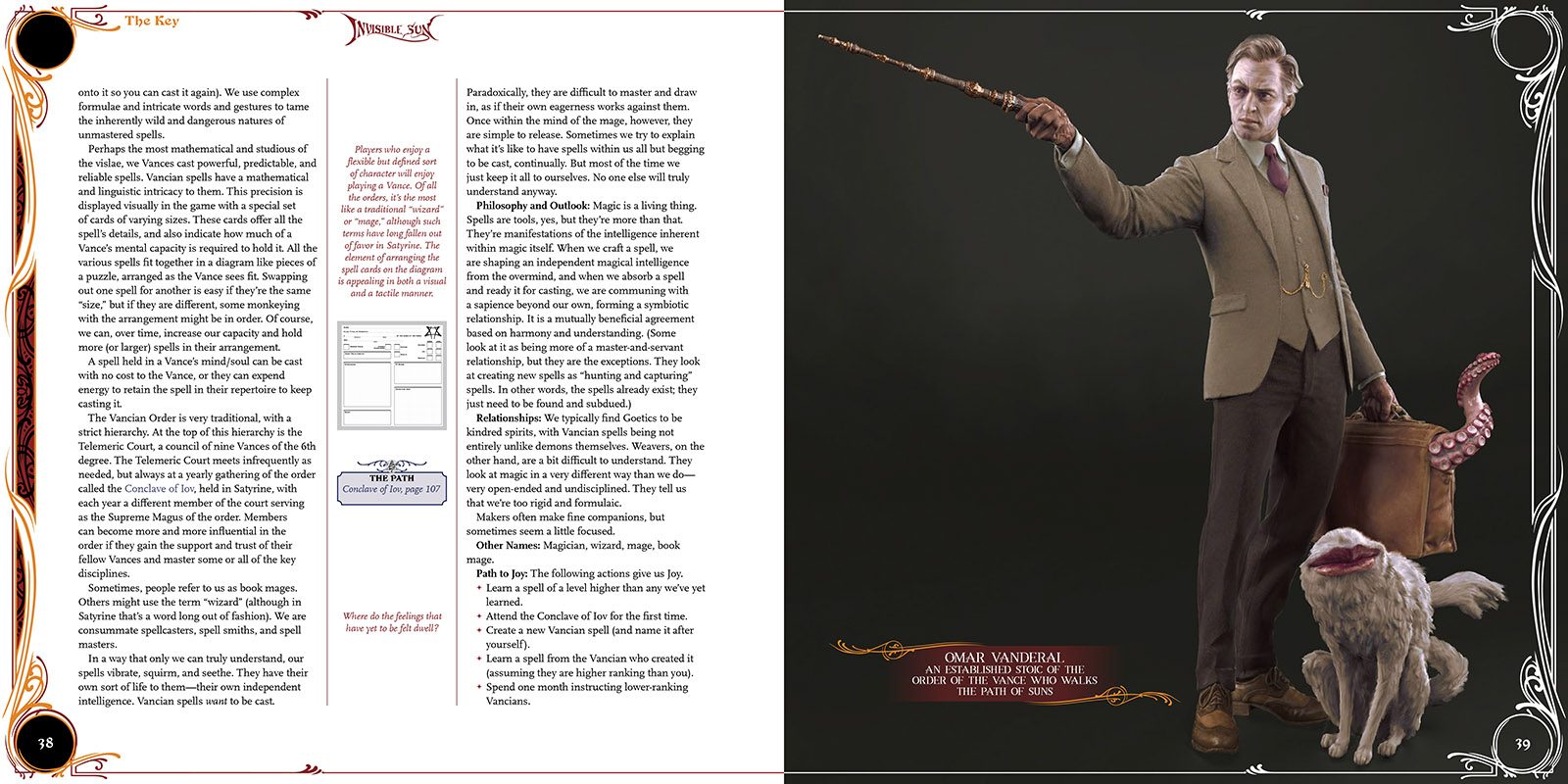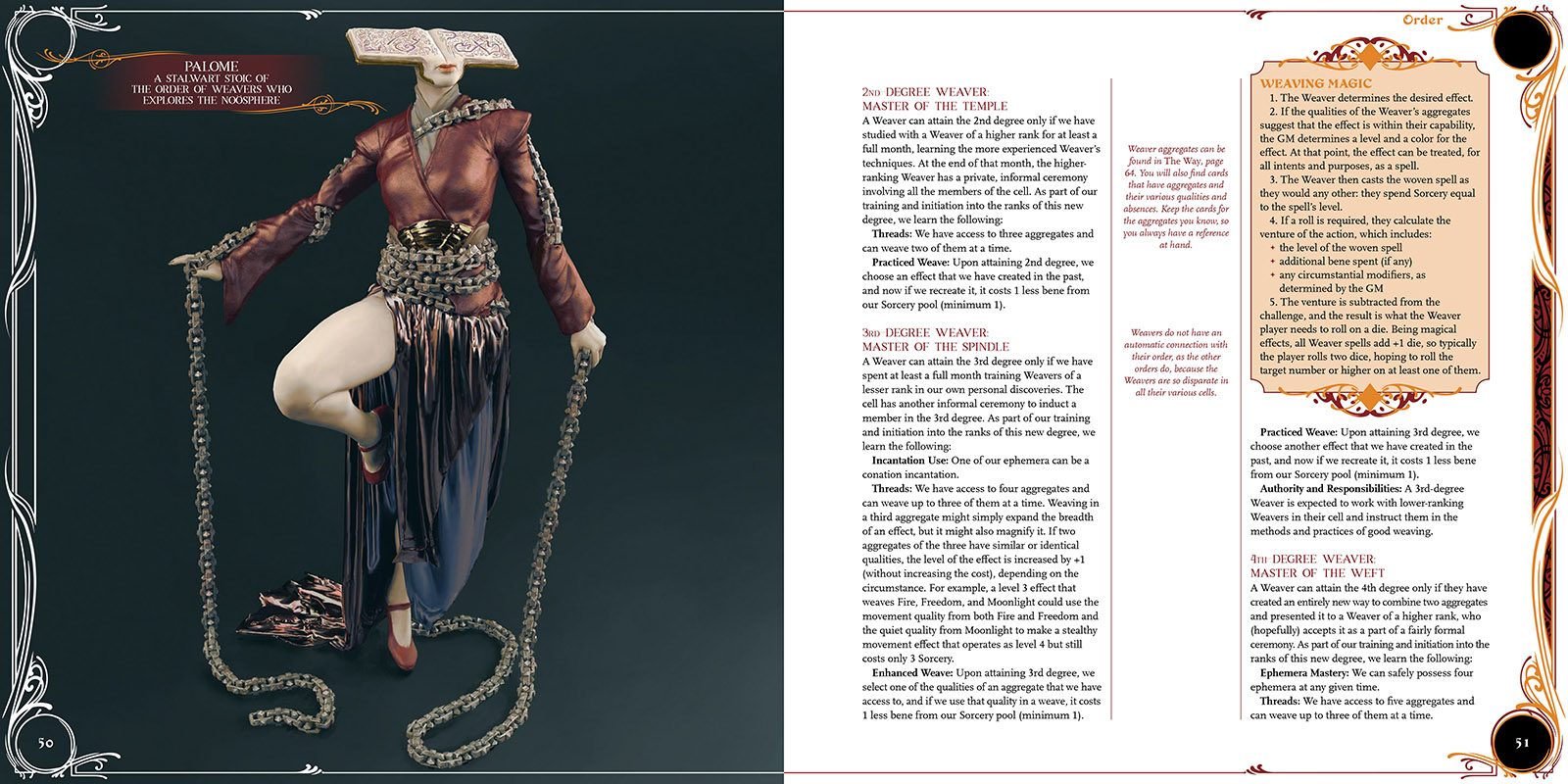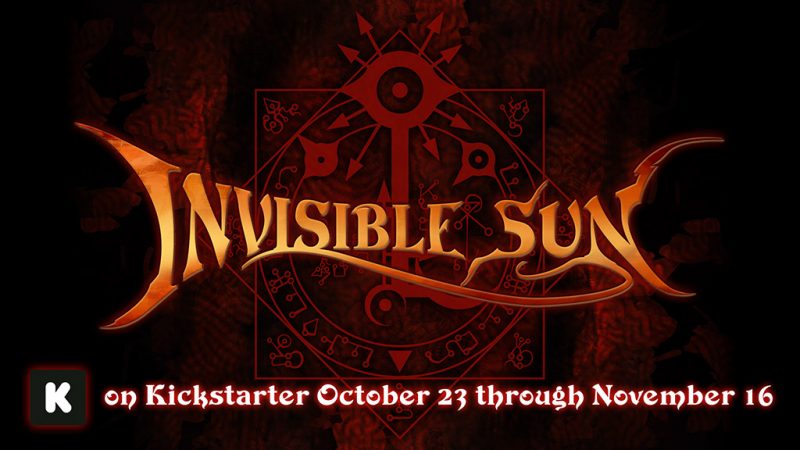What makes magic so special in Invisible Sun?
Magic is fluid, unpredictable, and ever nuanced in effect. Its secrets are boundless. But that does not mean it is without rules and methods. As part of character creation, a player selects an order: an organization that a vislae belongs to, and can advance within, which determines the way they express their magical talents. There are four orders, major schools of magical thought and training, and apostates who find their own paths and methods for wielding the power of magic.
Which order would you join? Read on to learn the myriad ways you might whirl, weave, whittle, and hurl spells in Invisible Sun.

The Order of the Vance
A Vance is an exemplary caster of spells. Vances know that spells are living things in their own right. They vibrate, squirm, and seethe. To learn a spell is to master it, like one masters a dangerous beast or—perhaps—like one makes an interesting friend. To study a spell is to ask it to inhabit you, like a spirit. And only a fool would put something dangerous into themselves, right? To cast a spell is to expel it from your mind and soul (unless you know the secret of grasping onto it even once cast). Vances use complex formulae and intricate words and gestures to tame the inherently wild and dangerous natures of unmastered spells.
Perhaps the most mathematical and studious of the vislae, Vances cast powerful, predictable, and reliable spells. Vancian spells have a mathematical and linguistic intricacy to them. This precision is displayed visually in the game with a special set of cards of varying sizes. These cards offer all the spell’s details, and also indicate how much of a Vance’s mental capacity is required to hold it. All the various spells fit together in a diagram like pieces of a puzzle, arranged as the Vance sees fit. Swapping out one spell for another is easy if they’re the same “size,” but if they are different, some monkeying with the arrangement might be in order. Of course, Vances can, over time, increase their capacity and hold more (or larger) spells in their arrangement.
A spell held in a Vance’s mind/soul can be cast with no cost to the Vance, or they can expend energy to retain the spell in their repertoire to keep casting it.
The Vancian Order is very traditional, with a strict hierarchy. Player characters can become more and more influential in the order if they gain the support and trust of their fellow Vances and master some or all of the key disciplines.
Players who enjoy a flexible but defined sort of character will enjoy playing a Vance. It’s the most like a traditional “wizard” or “mage” of all the orders, although such terms have long fallen out of favor in Satyrine. The element of arranging the spell cards on the diagram is appealing in both a visual and a tactile manner.
The Order of Makers
As their name suggests, Makers make. They might know a few spells, but first and foremost they focus their magic through objects that they craft. To put it another way, they turn their spells into objects that they can use. They can take other things—energy sources, spirits, demons, people—and make them into objects as well. “You heard about the Maker who found God?” the joke goes. “She made him into a necktie she wears only on religious holidays.”
Makers in the game get to design their own creations and determine their exact capabilities, although sometimes one’s own creation can contain a surprise or two. This involves a fun minigame/subsystem unique to Makers.
Makers are often more physical than other vislae, using the tools and weapons they craft to overcome challenges. However, Makers can still learn spells and charms like any of their fellows to supplement their order’s abilities.
The Order of Makers is a loose-knit collection of individuals. They meet only rarely, and usually only to show off their latest creations or trade the occasional crafting secret.
Players who aren’t interested in the traditional “spellcaster” type of character will find the Maker appealing. A player interested in combat could have a Maker who crafts weaponry and then uses it. But Invisible Sun isn’t necessarily a combat-focused game. So maybe your Maker would create a variety of simulacra to perform elaborate plays that you write. Or a vehicle that travels from raindrop to raindrop, following a storm. Or a fortress filled with mouths that speak the million sacred names. Or something that combines all of them.
The Order of Weavers
Weavers use creativity to cast spells. They take various qualities, which they call aggregates or—more colloquially—threads, and weave them together to get a desired effect. A weaver might have access to the aggregates of shields and moonlight and weave them together to create a spell of calming, secretive protection. If they also can pull a thread of hate, they can turn it into a spell of vengeance that comes in the night. Weavers make their spells up as they go and thus are always unpredictable. They are the artistes of the vislae.
Weavers can also learn a few premade spells to give themselves something to fall back on, the way a fantastic fencing master might carry a pistol at his side. Just in case.
The Order of Weavers is a collection of almost-unrelated cells. Each cell has its own hierarchy, its own rules, and its own outlook. Each is quite independent, but rarely hostile to the others.
Players who really want to stretch their creativity will love to play Weavers. They probably think well on their feet. They face fewer constraints. But weaving is more taxing than casting traditional spells. Choose this order if you like the idea of being able to do a few magical things with few limits rather than more things that have strict parameters.
The Order of the Goetica
Called pactlords by some and summoners, diabolists, and demonologists by others, goetics forge deals with powerful nonhuman entities in this and other universes and draw power from them in exchange for . . . various things. Allegiance, deeds, life force, or even more esoteric needs. Goetics call upon these pacts and the ancient rituals that accompany them to conjure, communicate with, and sometimes control spirits, demons, angels, and far stranger beings. They call upon these beings to serve them, help them, or simply do as they will.
The Nightside of the Path of Suns is a concept (revolving around a particular current of magic) originated by the goetics. Summoners who favor demonkind over other patrons and servants call themselves Walkers of the Nightside. Sometimes they refer to themselves as “we who favor our left hand.” Those who call upon angels or other gifts of the Legacy, then, could be referred to as “those favoring their right hand.” Many goetics, however, eschew such frippery.
Goetics must have a good understanding of the beings that they deal with. The complexities of entreating or attempting to control such entities make the undertaking tricky, to say the least. Dangerous to one’s very soul might be more accurate.
The Goetic Order is an intricate organization with a complex structure. Whole books of bylaws, guidelines, and requirements make it almost as complicated as the hierarchies of spirits that they interact with. As above, so below.
Players who like the idea of employing both diplomacy and domination mixed with a deep understanding of the immortal worlds and the complexities of magic should play goetics. They’ve got all the trappings of the classic demonologist if you want them, or you can go for something different if you just like the idea of summoning something else to do your dirty work for you, or to watch your back when you need it.
Apostates
Apostates are excommunicated members of the Invisible Church (the formal magical orders), though sometimes that so-called excommunication is self-imposed. They reject the other orders and even the idea of orders, existing outside those structures. Individualists, rebels, introverts, and castoffs, they find their own way by using bits of magic from each of the other orders, plus new discoveries they make. Sometimes while making rude gestures.
Apostates follow no single path. Rather, each Apostate has their own path—their own focus, specialization, and areas of expertise. They are explorers who eschew maps, blazing new trails, mostly for their own edification.
Likewise, obviously, Apostates have no organization or hierarchy. They are often quite unaware of each other. That is not to say, however, that Apostates are always loners, don’t have friends, or cannot learn to respect other vislae, even those who work within the system of magical orders.
Players who don’t want their character tied to any kind of organized structure might be interested in an Apostate. They lose access to some of the proprietary knowledge that the orders hold, but they gain the freedom to explore literally any sort of magic, or even invent their own.


